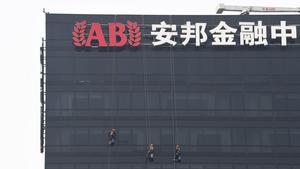 Workers clean windows on the Anbang Insurance building in Beijing on May 10, 2018. (GREG BAKER / AFP)
Workers clean windows on the Anbang Insurance building in Beijing on May 10, 2018. (GREG BAKER / AFP)
China ended its two-year State custody of Anbang Insurance Group Co, as Dajia Insurance Group, a new entity created to take over Anbang's life-and pension-insurance units as well as its asset management business, has developed capabilities to run the business normally.
The China Banking and Insurance Regulatory Commission said on Saturday it had finished running Anbang and the new company Dajia was close to a decision on introducing strategic investors.
The official announcement shows that Dajia has clarified its corporate governance structure according to regulatory requirements, said Wang Guojun, a finance professor at the University of International Business and Economics in Beijing.
The system of checks and balances has been further implemented in the new company
Wang Guojun, Finance professor at the University of International Business and Economics in Beijing
ALSO READ: Chinese regulator ends two-year takeover of Anbang Insurance
"The system of checks and balances has been further implemented in the new company. Previously, the power to manage Anbang was concentrated in the hands of its actual controller Wu Xiaohui. He had too much influence over the group," Wang said.
Authorities took control of Anbang in February 2018 after its former chairman Wu Xiaohui was arrested. He was later sentenced to 18 years in prison for fundraising fraud and embezzlement of corporate funds.
On Feb 22, 2019, the country's top banking and insurance regulator decided to extend the takeover for another year.
Anbang's corporate governance existed in name only, said Yang Zeyun, a finance lecturer at Beijing Union University.
"The revamped entity Dajia is looking for a batch of qualified strategic investors. Unlike former shareholders who were closely tied to Wu's family, new shareholders of the company will be free to give their opinion on business operations and vote for what they want," Yang said.
In the past, Anbang offered a large number of short-term products and used the money for long-term investment. This led to a mismatch between its assets and debts, causing insufficient solvency, he said.
Between 2015 and the first half of 2017, Anbang sold more than 1.5 trillion yuan (US$213.3 billion) of medium-and short-term wealth management insurance products.
Under the instruction of the regulator, all these products had been redeemed by the end of January this year, with not a single default or overdue.
To defuse financial risks at Anbang, the regulator approved the establishment of Dajia Insurance Group, which was registered on June 25, 2019 in Beijing with 20.36 billion yuan of capital, to take over equity in Anbang's life insurance, annuity insurance and asset management operations.
Dajia also set up a unit to take over some of the insurance policies, assets and liabilities of Anbang's property and casualty business.
The regulator said it will help Dajia remain as a private company, enhance its corporate governance structure, improve its repayment capacity and management, and promote sustainable and sound development of the insurer by strengthening prudential regulation.
Ever since its establishment, the new group has been restructuring corporate management and making a business transformation.
Nowadays, life insurance policies covering a period of five years and above account for more than 75 percent of total life insurance policies at Dajia, significantly improving the insurer's debt structure which was previously dominated by medium-and short-term products.
The annuity insurance unit of Dajia carried out pilot old-age service projects at core areas in cities. Its business volume totaled 44.5 billion yuan in 2019.
READ MORE: Anbang to sell Waldorf Astoria condos, report claims
Dajia is transitioning into the business model of mainstream insurance companies by moving from short-term business to medium-and long-term business while developing annuity and medical insurances. This will meet the needs of national development against the backdrop of China's efforts to tackle the challenges of an aging population, Yang said.
The regulator has basically completed the disposal of Anbang's noncore financial businesses including Century Securities Co, AB Leasing Co, and Hexie Health Insurance Co.
China Insurance Security Fund Co, a nonprofit State-owned company operating the insurance industry's bailout fund, played a key role in the regulator's two-year takeover of Anbang by injecting capital into the troubled insurer, sending people to clear up its problems, restructuring the company and selling off its assets, Wang said.



